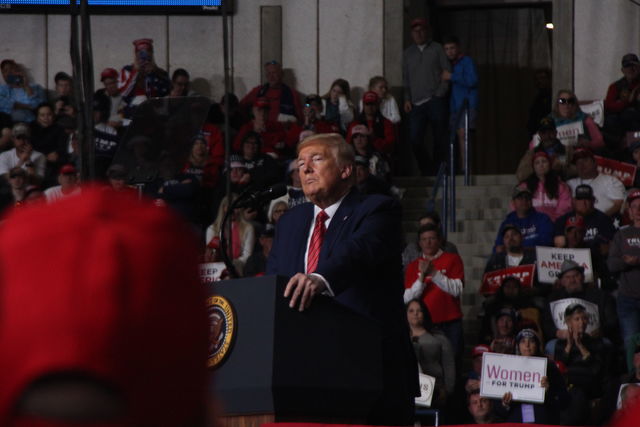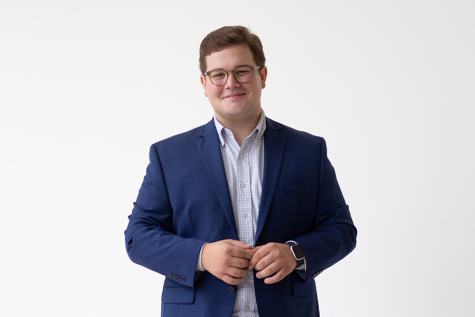OPINION – Reporter’s notebook: My takeaways from Trump’s Charleston rally ahead of S.C.’s primary
March 3, 2020
CHARLESTON, S.C. — Friday, Feb. 28 brought a lot of firsts for me. The first campaign rally I covered as a member of the press, the first time I was in the presence of the President of the United States and, unfortunately, the first time I felt a target on my back as a journalist.
Senators Lindsey Graham (R-SC) and Tim Scott (R-SC), Governor Henry McMaster (R-SC) and Lieutenant Governor Pamela Evette (R-SC), among other local republican political figures, joined Mr. Trump and 15,000 of his biggest fans at the North Charleston Coliseum for his “Keep America Great” rally ahead of the South Carolina presidential primary election even though South Carolina election officials cancelled their republican primary.
One of my first observations was the demographic makeup of the crowd. The majority of the crowd was white. This is not something unheard of in relation to Mr. Trump’s rallies. However, it was incredibly shocking to see in-person.
Historically, Mr. Trump uses a majority of his speaking time to attack numerous people and events. By my estimation, the most mentioned group was, in fact, the press. Every time the president would mention the press as a whole or a singular entity (i.e. CNN or MSNBC), the attendees would boo in unison and the general admission audience standing in front of him would turn towards the press pool and give us hand gestures, some trivial, like a thumbs down, others were more explicit, like flicking us off.
The press pool was positioned on the ground floor of the arena about 100 feet from the president. I went up into the arena a couple of times, and each time, people would keep their legs in the aisle, making it difficult for me to go up. None of these actions were violent and I never felt unsafe, I just felt there was a lack of respect for another human simply because I was wearing my White House and press pass.
Thirty minutes into his speech, Mr. Trump began to talk about the Democratic presidential candidates. Using their pet names, he went down the list blasting (almost) all of the major candidates: “Sleepy” Joe Biden, “Crazy” Bernie Sanders, “Mini” Mike Bloomberg, “Pocahontas” Elizabeth Warren, “Mr. Impeachment” Tom Steyer and Amy Klobuchar (who does not have a nickname).
As I was reviewing my notes moments after he moved on, I realized Mr. Trump left someone out: Pete Buttigieg, former mayor of South Bend, Indiana and winner of the Iowa caucus. I was shocked that he didn’t even bring him up.
Crowd chants have become a normalcy at a Trump rally, and the Charleston rally was no exception. “USA, USA, USA,” “Build that wall,” “Trump, Pence,” “Four more years” and “10 more years,” just to name a few.
I spoke with many people in the crowd from all backgrounds: men, women, old, young and immigrants who couldn’t even vote. All had a similar sentiment: Mr. Trump is running the country like a business, and that’s what America needs. I brought up past gaffs, treatment of women and general rhetoric, but none seemed to care. For some, it was their first presidential election, while others have been voting since the 1970s. Regardless of voting experience, all will, or would be, voting for President Trump.
Mr. Trump spoke for just under an hour and a half. Other topics included the coronavirus, the Academy Awards, the nomenclature of “black” versus “African-American,” “The Apprentice,” South Carolina’s 2.3% unemployment rate, House leader Nancy Pelosi (D-CA) and Senate minority leader, Chuck Schumer (D-NY), his recent trip to India, the new Mexico-Canada-America (MCA) trade agreement, the gang MS-13 and sanctuary cities.
According to the Associated Press, Biden swept the state in the following day’s primary with 48.4% of the vote, followed by Sanders with 19.9%, then Steyer with 11.3% (who dropped out of the race following his loss), Buttigieg with 8.2% (who dropped out on Sunday), Warren with 7.1%, Klobuchar with 3.2% (who left the race Monday afternoon) and the remaining 1.9% going to other candidates, some of whom had been out of the presidential race for weeks.
Covering a campaign rally was a new and exciting experience for me. As a self-proclaimed “political hobbyist” (someone who isn’t necessarily active in politics by participating in events, going door-to-door for their candidate, etc., but rather knowledgeable about the political landscape around them), it was interesting to hear the president speak in person.
I urge anyone interested, even in the slightest, in any candidate to attend one of their rallies. You’re only going to see so much of a particular person on television, in the paper or on social media. Attending a rally in-person will allow you to hear from a candidate without any barriers: just you, the candidate and thousands of his or her supporters. America needs a self-informed electorate, and it all starts with you.
Andy Cole, The George-Anne contributor, gaeditor@georgiasouthern.edu




